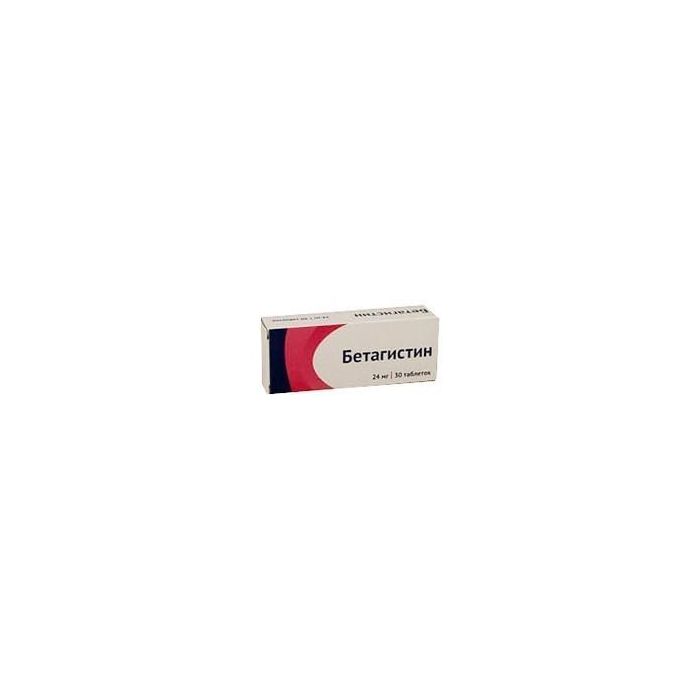betahistine | Betagistin-SZ tablets 24 mg, 30 pcs.
Special Price
$16.66
Regular Price
$24.00
In stock
SKU
BID472366
Latin name
Betahistine
Betahistine
Latin name
Betahistine
Release form
Tablets.
packaging 30 pcs
Pharmacological action of
Betagistin is a histaminergic that improves microcirculation.
Pharmacodynamics
Agonist of the H1 receptors of the vessels of the inner ear and an antagonist of the H3 receptors of the vestibular nuclei of the central nervous system. Through direct agonistic action on the H1 receptors of the vessels of the inner ear, as well as indirectly through the action on the H3 receptors, it improves microcirculation and capillary permeability, normalizes endolymph pressure in the labyrinth and cochlea, and increases blood flow in the basilar artery.
It has a pronounced central effect, being an inhibitor of the H3 receptors of the vestibular nerve nuclei. It improves the conductivity in the neurons of the vestibular nuclei at the level of the brain stem.
The clinical manifestation of these properties is a decrease in the frequency and intensity of dizziness, a decrease in tinnitus, and an improvement in hearing if it is reduced.
Pharmacokinetics
Absorbed rapidly binding to plasma proteins is low. The time required to reach Cmax is 3 hours.
It is almost completely excreted by the kidneys in the form of a metabolite (2-pyridylacetic acid) within 24 hours. T1 / 2 - 3-4 hours.
Indications
treatment and prevention of vestibular dizziness of various origins
syndromes including dizziness and headache, tinnitus, progressive hearing loss, nausea and vomiting
disease or Meniere's syndrome.
Use during pregnancy and lactation
Insufficient data to evaluate the effects of betahistine during pregnancy and lactation. In this regard, it is not recommended to take during pregnancy. At the time of treatment, it is necessary to stop breastfeeding.
Composition
1 tablet contains:
Active ingredient: betahistine dihydrochloride 24 mg
Excipients: MCC lactose (milk sugar) citric acid silicon monohydrate colloidal dioxide (aerosil) crospovidone talc magnesium stea.
Dosage and Administration
Inside, with meals. 1 / 2-1 tablets 3 times a day.
Improvement is usually noted already at the beginning of therapy. A stable therapeutic effect occurs after two weeks of treatment and can increase over several months of treatment. The treatment is long. The duration of the drug is selected individually.
Side effects
Gastrointestinal disorders, allergic reactions from the skin (skin rash, itching, urticaria), Quincke edema.
Drug Interaction
The effectiveness of Betahistine is reduced by antihistamines.
Overdose
Symptoms: nausea, vomiting, convulsions.
Treatment: gastric lavage, activated carbon intake, symptomatic therapy.
Storage conditions
In a dry, dark place at a temperature of no higher than 25 РC. Keep out of the reach of children.
Expiration
2 years.
Active ingredient cos
betahistine
Conditions of supply of
pharmacies prescription
dosage form
dosage form
tablets
Northern Star, Russia
Betahistine
Release form
Tablets.
packaging 30 pcs
Pharmacological action of
Betagistin is a histaminergic that improves microcirculation.
Pharmacodynamics
Agonist of the H1 receptors of the vessels of the inner ear and an antagonist of the H3 receptors of the vestibular nuclei of the central nervous system. Through direct agonistic action on the H1 receptors of the vessels of the inner ear, as well as indirectly through the action on the H3 receptors, it improves microcirculation and capillary permeability, normalizes endolymph pressure in the labyrinth and cochlea, and increases blood flow in the basilar artery.
It has a pronounced central effect, being an inhibitor of the H3 receptors of the vestibular nerve nuclei. It improves the conductivity in the neurons of the vestibular nuclei at the level of the brain stem.
The clinical manifestation of these properties is a decrease in the frequency and intensity of dizziness, a decrease in tinnitus, and an improvement in hearing if it is reduced.
Pharmacokinetics
Absorbed rapidly binding to plasma proteins is low. The time required to reach Cmax is 3 hours.
It is almost completely excreted by the kidneys in the form of a metabolite (2-pyridylacetic acid) within 24 hours. T1 / 2 - 3-4 hours.
Indications
treatment and prevention of vestibular dizziness of various origins
syndromes including dizziness and headache, tinnitus, progressive hearing loss, nausea and vomiting
disease or Meniere's syndrome.
Use during pregnancy and lactation
Insufficient data to evaluate the effects of betahistine during pregnancy and lactation. In this regard, it is not recommended to take during pregnancy. At the time of treatment, it is necessary to stop breastfeeding.
Composition
1 tablet contains:
Active ingredient: betahistine dihydrochloride 24 mg
Excipients: MCC lactose (milk sugar) citric acid silicon monohydrate colloidal dioxide (aerosil) crospovidone talc magnesium stea.
Dosage and Administration
Inside, with meals. 1 / 2-1 tablets 3 times a day.
Improvement is usually noted already at the beginning of therapy. A stable therapeutic effect occurs after two weeks of treatment and can increase over several months of treatment. The treatment is long. The duration of the drug is selected individually.
Side effects
Gastrointestinal disorders, allergic reactions from the skin (skin rash, itching, urticaria), Quincke edema.
Drug Interaction
The effectiveness of Betahistine is reduced by antihistamines.
Overdose
Symptoms: nausea, vomiting, convulsions.
Treatment: gastric lavage, activated carbon intake, symptomatic therapy.
Storage conditions
In a dry, dark place at a temperature of no higher than 25 РC. Keep out of the reach of children.
Expiration
2 years.
Active ingredient cos
betahistine
Conditions of supply of
pharmacies prescription
dosage form
dosage form
tablets
Northern Star, Russia
Write Your Own Review

